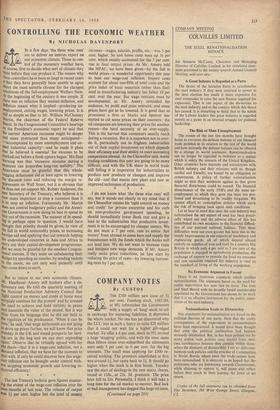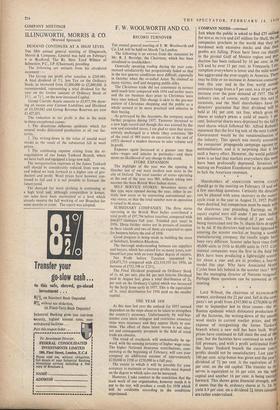COMPANY NOTES
By CUSTOS •
THE £300 million new issue of 5+
per cent. Funding stock, 1982/84,
411.5•./ \ at 981 refurnishes the Government with a supply of `long' stock to sell in exchange for maturing liabilities. It depressed the whole market. No one has yet discovered why the LCC was in such a hurry to raise £20 million that it could not wait for a higher gilt-edged market. To offer a 6 per cent. stock at 99+ invited a huge 'stagging' public, and with the issue more than fifteen times over-subscribed the allotments were only 5 per cent. to 6 per cent. for the big amounts. The small man applying for £100 re- ceived nothing. The premium established at first was around 11, but came back to 11-. It should go higher when the stock is in firm hands. Tuesday saw the start of dealings. in the new SHELL shares, issued at 110s., at 23s. 3d. premium. The price later fell to 21s. Personally, I think it will take a long time for the oil market to recover. Bad luck or bad management has dogged this huge oil issue.
(Continued on page 214)
COMPANY NOTES—continued Just when the public is asked to find £75 milli°, for ROYAL DUTCH and £45 million for Shell, the co companies proclaim to the world that they are burdened with excessive stocks and that their profits are falling. Prices have been cut sharplY in the pivotal Gulf of Mexico region and PO' duction has been reduced by 16 per cent. in the US and by over 11 per cent. in Venezuela. COn* sumption everywhere is lower and the mild winter has aggravated the over-supply in America. There may be little or no increase in American consume' tion this year and in the free world outside estimates range from a 5 per cent. to a 10 per cent; increase over the poor demand of 1957. The oil, industry can, of course, easily meet this sort the recession, and the Shell shareholders have We directors' guarantee that their dividend will be held at 18+ per cent. tax free, which gives the shares at today's prices a yield of nearly 5 Per cent. Industrial shares were depressed by the fall in steel shares which followed Mr. Alfred Robens's statement that the first big task of the next Labour Government would be the renationalisation of the industry. This speech was merely answering the companies' propaganda campaign against re; nationalisation, and it is surprising that it ha°, such a heavy effect. However, the world political news is so bad that markets everywhere this Week have been profoundly depressed. Investors are waiting on President Eisenhower to do something to halt the American recession.
Shareholders of ASSOCIATED MOTOR CYCLES should go to the meeting on February 18 and ask a few searching questions. Certainly the directors can be pleased with some recovery in the motor' cycle trade in the year to August 31, 1957. ProP were doubled, but comparison must be made with the disastrous year preceding. Earnings on th" equity capital were still under 5 per cent. befole tax adjustment. The dividend of 5 per cent. being maintained and the 5s. shares have dropPed to 4s. 6d. If the directors had not been opposed 1" entering the scooter market or buying a scooter manufacturing, company the results might ha"' been very different. Scooter sales have risen froir 40,000 units in 1956 to 80,000 units in 1957. Coll' tinental companies were the first in the field bill BSA have been producing a lightweight scoote' for about a year and are to produce, a heavier model this year. Why have Associated Moto' Cycles been left behind in the scooter race? W11' has the managing director of Nortons resigned Perhaps these questions can be answered at tlic meeting.
*
Lord Wilmot, the chairman of tu..iNowoR MORRIS, attributed the 22 per cent. fall in the cool" pany's net profit from £345,000 to £270,000 in the year to September last to three causes—the in" fluenza epidemic which dislocated production 31 all the factories, the writing-down of the unsold wool stocks to current market prices, and lb' expense of reorganising the James Tankard branch where a new mill has been built. Wool prices have continued to fall since the end of the year, but the factories have continued to work al full pressure, and with a profit anticipated fro° the James Tankard branch the current year profits should not be unsatisfactory. Last year 3 100 per cent. scrip bonus was given and the year dividend of 7+ per cent. is the equivalent of per cent. on the old capital. The transfer to re' serves is equivalent to 16 per cent. on the neo' capital and another 16 per cent. is being carried forward. This shows great financial strength, and it seems that the 4s. ordinary shares at 3s. 3d. to yield 8.9 per cent. on a dividend 21 times covered are rather undervalued.































 Previous page
Previous page